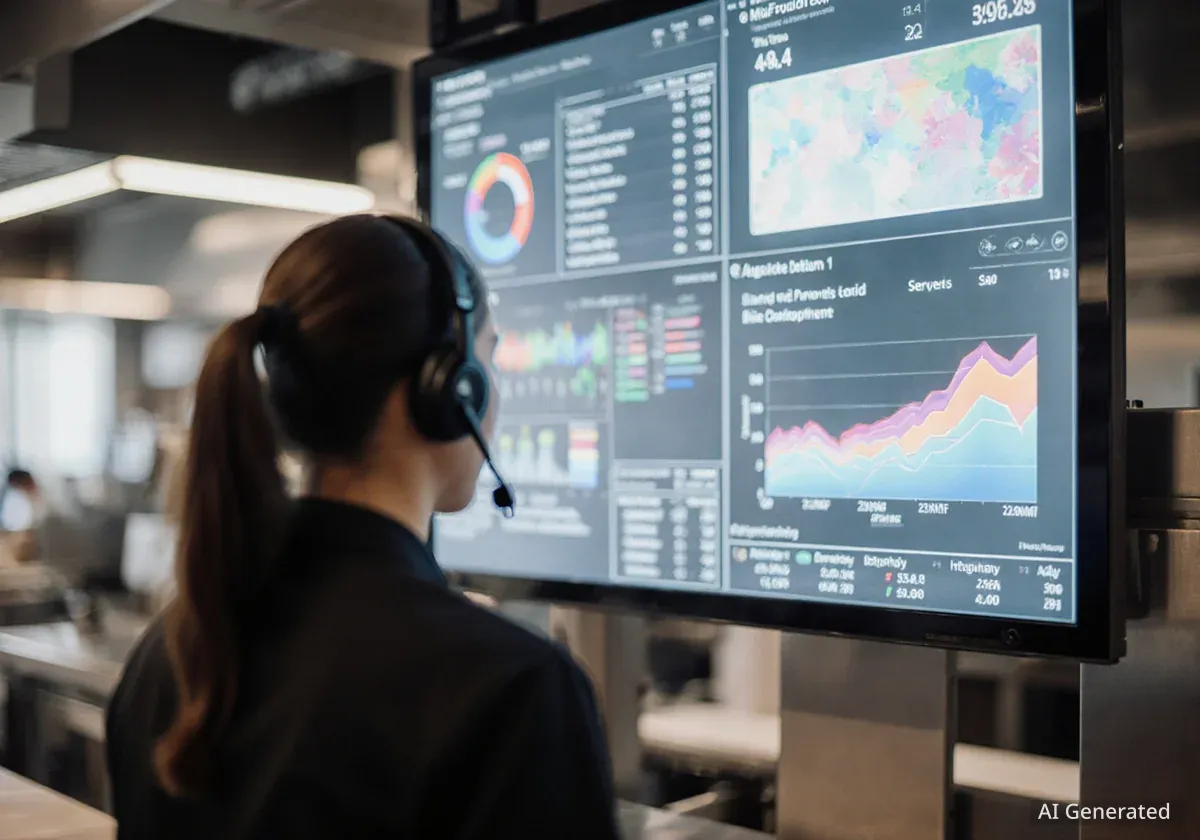An analysis of corporate communications from America's largest companies reveals a significant gap between the frequent discussion of artificial intelligence and the ability to articulate its concrete business advantages. While executives often express enthusiasm for AI on earnings calls, official regulatory filings paint a more cautious picture, highlighting risks over clear financial returns.
According to a review of S&P 500 company filings and transcripts from the past year, many businesses appear to be adopting AI due to competitive pressure rather than a well-defined strategy. This trend suggests that while investment and conversation around AI are high, measurable benefits remain elusive for many outside the core technology sector.
Key Takeaways
- A Financial Times analysis found S&P 500 companies frequently mention AI but often fail to specify its positive impact.
- On earnings calls, 374 of S&P 500 companies discussed AI, with 87% of mentions being entirely positive.
- In contrast, official SEC filings emphasize risks such as cybersecurity, implementation failure, and legal issues.
- Cybersecurity was the most cited AI-related risk, mentioned by over half of the S&P 500 in 2024.
- Experts suggest a "fear of missing out" (FOMO) is a primary driver for AI adoption, not necessarily a clear business case.
A Tale of Two Messages: Public Optimism vs. Private Caution
When communicating with investors, top executives from S&P 500 companies are overwhelmingly positive about artificial intelligence. An examination of earnings calls over the last 12 months shows that 374 of these major corporations mentioned AI. Of those discussions, a striking 87% were categorized as wholly positive, with no concerns expressed.
However, a different narrative emerges from the legally mandated 10-K filings submitted to the Securities and Exchange Commission (SEC). In these documents, companies are required to disclose potential risks to their business. The language used is far more reserved, often focusing on the potential downsides of AI implementation.
This discrepancy highlights the dual messaging used by corporations. While earnings calls serve to build investor confidence, regulatory filings reveal a more sober internal assessment of the technology's current state and its associated challenges.
Filings vs. Earnings Calls
SEC filings are legal documents where companies must be transparent about risks that could impact their financial performance. Earnings calls are public presentations where executives often emphasize positive developments and future growth prospects to investors. The differing tones reflect these distinct purposes.
The Elusive Search for Tangible Benefits
While tech giants like Microsoft, Alphabet, and Meta have committed to investing a combined $300 billion this year in AI infrastructure, companies outside of Silicon Valley struggle to define the technology's value. Firms ranging from Coca-Cola to Lululemon are increasing their mentions of AI, but the expected benefits are often stated in vague terms.
Commonly cited advantages include "increased productivity," "workflow optimization," and achieving "market differentiation." For example, during a recent earnings call, Coca-Cola's primary example of a successful AI application was its use in producing a television commercial. Such examples lack the specific, quantifiable impact that investors look for.
“When it comes to AI adoption, many companies aren’t guided by strategy but by ‘Fomo’,” said Haritha Khandabattu, a senior director analyst at the consultancy Gartner. “For some leaders, the question isn’t ‘What problem am I solving?’ but ‘What if my competitor solves it first?’”
Some sectors have found it easier to demonstrate value. Payroll services provider Paycom noted in its filings that AI is an "important differentiator" for attracting and retaining clients. Other innovative uses include military supplier Huntington Ingalls applying AI for "battlefield decisions" and animal health group Zoetis using it to accelerate medical tests for horses.
AI Adoption and Stock Performance
There is no clear correlation between discussing AI and improved stock performance for most companies. Since November 2022, manufacturer Dover Corporation, which uses AI to track damaged vehicles, saw its stock perform roughly in line with the S&P 500 Equal Weighted index, indicating that AI adoption alone has not led to outsized growth.
Risks Outweigh Rewards in Official Disclosures
As corporate discussions around AI have increased, so have the documented concerns. The analysis shows that companies are much clearer about the potential problems associated with AI than they are about the upsides. The number of businesses expressing positive views in their filings has actually decreased since 2022.
The Top Three Corporate Concerns
- Cybersecurity: This was the most frequently mentioned risk, cited by more than half of the S&P 500 companies in 2024. Online dating company Match warned that AI use could lead to cybersecurity incidents involving user data. Lululemon expressed similar concerns about transaction data being compromised.
- Implementation Failure: The second-largest concern is that AI projects will not succeed. Research from Microsoft and the MIT Media Lab found that 95% of generative AI pilots in the workplace failed. This high failure rate is attributed to current AI tools lacking features like long-term memory and easy customization for existing systems.
- Legal and Regulatory Hurdles: A significant number of companies (174 in their annual reports) cited rising legal and regulatory issues as a major concern. Meta, despite its heavy investment in AI, warned of potential legal settlements over the use of copyrighted materials for training its models. PepsiCo also noted that its use of AI could lead to infringement claims.
Even Microsoft cautioned that inadequate AI deployment could "cause harm to individuals, customers, or society." This sentiment was echoed by AI governance expert Ray Eitel-Porter, who stated, “Companies tend to see AI as a risk because they’re not used to having systems or processes which they can’t rely upon 100 per cent.”
Where AI's Impact is Clear
Despite the general ambiguity, one area where the benefits of AI are concrete is in the ecosystem supporting its growth. Companies involved in the data center boom are seeing direct and measurable positive impacts.
Energy companies such as First Solar and Entergy have identified AI as a significant new driver of electricity demand. Similarly, Freeport-McMoran, a major copper producer, stated that the growth of data centers and AI would support the price of copper, a critical component in their construction.
Equipment manufacturer Caterpillar also reported that its energy division is benefiting from supporting "data centre growth related to cloud computing and generative artificial intelligence." For these businesses, the AI wave is not an abstract concept but a tangible source of revenue and demand.
However, for the broader market, the path to profitability from AI remains uncertain. As Meta stated in its 10-K form, “there can be no assurance that the usage of AI will enhance our products or services or be beneficial to our business.” This reflects the current reality for many of America's top companies: the AI revolution is being talked about far more than it is being effectively implemented.





